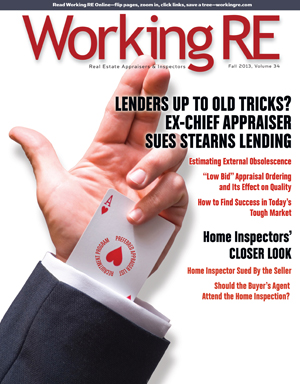 |
>> See Past News Editions >> Click to Print >> Upcoming Webinars: – Feb 13th: There’s WHAT in Your Workfile? – Mar 11th: Fannie Mae’s New Appraisal Quality Monitor (AQM) – Impact on Appraisers >> Make More in 2014 / Get more Non-Lender work with the Full-Fee Directory and Marketing Guide – Work directly with clients, get paid full-fees and diversify your business. Click here to learn more. |
Editor’s Note: Lenders and appraisers have been in a tug of war over who is responsible for the actions of appraisal management companies, particularly when it comes to paying (or not paying) delinquent appraiser fees. The OCC offers some guidance.
OCC: Lenders Responsible for AMCs
by Isaac Peck, Associate Editor
In light of the recent problems that many appraisers have faced in getting paid by appraisal management companies (AMCs), appraisers will be interested to know that the Office of the Comptroller of the Currency (OCC) has issued a new Bulletin (Oct. 2013) to all national banks, that provides guidance on how to manage the risk inherent in third-party relationships, better known as AMCs.
A series of AMCs, facing either cash flow problems or bankruptcy, have stiffed appraisers in the last few years. In some cases lenders have been deemed responsible for unpaid fees. In other instances, appraisers and real estate agents owed money by failed AMCs have been out of luck.
The primary mission of the OCC is to charter, regulate, and supervise all national banks and federal savings associations. It also supervises the federal branches and agencies of foreign banks.
(story continues below)

(story continues)
Recent court cases have left appraisers wondering whether banks are responsible for the actions of their AMCs. Many make the case that banks are responsible for the actions of their agents by citing federal regulations, including Dodd-Frank and the Interagency Guidelines, which require lenders to procure appraisals either directly or through an agent (see Appraiser Wins “AMC-Agent” Judgment Against One-West Bank). The argument goes that if an AMC is not the agent of a lender, as many lenders argue, does that mean they are in violation of federal guidelines? The context is usually appraisers trying to collect monies from lenders that are owed to them by delinquent AMCs.
While it doesn’t directly address AMCs and the topic of agency, the OCC bulletin touches on many of the issues that concern appraisers who frequently find themselves performing work for lenders indirectly through third-parties representing the lenders, better known as AMCs. (Find a link to the OCC Bulletin below.)
The OCC writes that a bank’s “use of third-parties does not diminish the responsibility of its board of directors and senior management to ensure that the activity is performed in a safe and sound manner and in compliance with applicable laws.”
For appraisers who have been paying attention to many of the AMC bankruptcies and closures in the last three years, the following Guidance should ring a bell: “The OCC has identified instances in which bank management has:
- failed to properly assess and understand the risks and direct and indirect costs involved in third-party relationships.
- failed to perform adequate due diligence and ongoing monitoring of third-party relationships.
- entered into contracts without assessing the adequacy of a third-party’s risk management practices.
- entered into contracts that incentivize a third-party to take risks that are detrimental to the bank or its customers, in order to maximize the third-party’s revenues.
- engaged in informal third-party relationships without contracts in place.”
(story continues below)

(story continues)
Use of Third-Parties Increasing
The Guidance begins by acknowledging that banks are continuing to increase the number and complexity of relationships with third-parties, including “outsourcing entire lines of business or products,” “contracting with third-parties that subcontract activities to other foreign and domestic providers,” and “outsourcing entire bank functions to third-parties.”
Appraisers know this all too well, as most have been directly affected by the decision by lenders to no longer manage the appraisal procurement and review process internally. Indeed, the insertion of AMCs into the appraisal process is a good example of how many essential functions, which have traditionally been managed by banks internally, are now being outsourced to third-parties. The OCC warns that this increasing reliance on third-parties creates additional risk and cites a strong concern that “the quality of risk management over third-party relationships may not be keeping pace with the level of risk and complexity of these relationships.”
The fact that some banks may not be adequately managing the risk inherent in their third-party relationships is also an issue that has directly affected many appraisers. The closures and bankruptcies of several prominent AMCs in recent years, including AppraisalLoft, JVI Solutions, and Evaluation Solutions/ES Appraisal Services, have affected thousands of appraisers and resulted in appraisers collectively being left unpaid for millions of dollars of work. (Please see below for related stories.)
Due Diligence
OCC guidance touches on many issues that are relevant to the relationships that exist between banks and AMCs. Among them are a bank’s responsibilities to conduct appropriate due diligence on its third-party AMCs. This due diligence requirement includes an obligation to “assess the third-party’s financial condition…[and] evaluate growth, earnings, pending litigation, unfunded liabilities, and other factors that may affect the third-party’s overall financial stability.” This indicates that banks are responsible for ensuring that the AMCs it selects to do business with are financially stable and capable of meeting their financial obligations to appraisers and other parties.
The bank is also required to “determine whether the third-party has the necessary licenses to operate and the expertise, processes, and controls to enable the bank to remain compliant with domestic and international laws and regulations.” The broadness of this requirement can be applied to a variety of factors relating to which AMCs a bank uses. This means that the bank is not only directly responsible for ensuring that the AMCs it uses are licensed in every state in which it does business, but it also must ensure that the AMCs have the proper expertise and processes in place to comply with relevant regulations. In the context of the appraisal process, this requirement can be applied to the appraisal review process, questions of geographic competency, the selection of the appropriate appraiser for the job, and much more.
Background Checks
Appraisers who are increasingly being asked to undergo background checks to qualify for particular clients, might appreciate that the OCC mandates banks to assess the qualifications, backgrounds, and reputations of all principals of any company performing services for the bank. Specifically, banks must “ensure the third-party periodically conducts thorough background checks on its senior management and employees as well as on subcontractors who may have access to critical systems or confidential information.” The addition of “subcontractors” in this requirement raises the question of whether appraisers fall under this definition and might explain why some banks have included background check requirements as a prerequisite to serving on their appraisal panels.
Ongoing Monitoring
In addition to conducting initial due diligence when first contracting with a third-party, the OCC indicates that the bank must continually monitor its third-party relationships using the criteria outlined during the Due Diligence phase.
Supervisory Review of Third-Party Relationships
The guidance ends with the OCC reserving the right to audit third-parties that a bank engages and “examine the functions or operations performed by a third-party on a bank’s behalf.” The OCC indicates that such examinations might include an assessment of “the financial and operational viability of the third-party to fulfill its contractual obligations, compliance with applicable laws and regulations…and whether the third-party engages in unfair or deceptive acts or practices in violation of federal or applicable state law.” In short, AMCs could very well end up on the receiving end of an OCC “examination” if the OCC is interested in ensuring that an AMC is financially viable and in compliance with relevant laws and regulations.
Much of the new guidance issued by the OCC can be read in such a way where it is applicable to lender/AMC relationships. Perhaps the most important question is: will the OCC enforce its own guidance? Appraisers can only hope so.
Relevant Stories:
Chase Denies Responsibility for Bankrupt AMC Debt
Bankruptcy Court Absolves Chase of All Liability
Appraiser Wins “AMC-Agent” Judgment Against One-West Bank
Success Collecting AMC Debt From Lender
Wells Fargo Paying JVI Bad Debt
AMC Fails: Appraisers Stiffed Again
OCC Guidance:
OCC Bulletin 2013-29
New Webinar: Fannie Mae’s New Appraisal Quality Monitor (AQM) – Impact on Appraisers
We’re always listening: Send your story submission/idea to the Editor: dbrauner@orep.org.


by Avery
Unionization is the only answer! When your accountant
-does your taxes and tells you worked for minimum wage this year
you will see the value in the Appraisers Guild.
by Mike Ford
Informative article, and it demonstrates at least one federal agency is addressing AMC insolvency and inadequate QC.
Lets not jump for joy yet. What some of their actions mean, is that small, localized AMC’s with geographic competence will be forced out of business, and only the “big boys” will be allowed to play Financial solvency ‘guidelines’ will be written to drive them out of business. Not that being big is in any way an indicator of financial solvency (remember AIG and all the ‘other’ too big to fail corps?).
It also means that more and more of us will be asked to pay $60 background fees for the privilege of working for low fees. That brings up another compliance issue; reasonable and customary (fees & turn times). One AMC recently required a stipulation in writing from the appraiser that all their fees (no matter what they may be for a given assignment); AND 1 to 2 day max turn times, were “reasonable and customary”. Any bets they are now arguing that virtually ALL their appraisers think they pay reasonable fees?
Folks, in the end we are all going to have to hold our noses and unionize. NO ONE else is looking out for us. They are merely creating bureaucratic ‘compliance check lists’ that will continue to pass the buck along to us.
The appraiser that finally beat Chase was a member of the Appraisers Guild; OPIEU of the AFL-CIO. Pains me to say it, but Id rather give money to a union that I CAN influence, than to an AMC that I cannot.
-by Silvio
An AMC I had done work is not able to pay its bills and has sought the help of a company to reach settlements with creditors. The latest offering is $50 a month for the next 5 years with no guarantees. The lenders for the appraisal assignments I performed were mortgage companies, not banks. Would the Dodd-Frank Act apply to mortgage companies as well?
-by Cap'n Dave
Since no one wants to protect the appraisers and we are working virtually for free, it is time appraisers unite and refuse to work for any and all AMCs.
-by Mike Ford
Dave, if ALL of us did that for only ONE MONTH, it would bring an immediate halt to AMC low fees and unreasonable turn times. It would ALSO gain us the attention of the lawmakers we can’t reach otherwise.
-by Carol
Thanks, Mr. Peck for writing an article that’s “appraiser friendly”.
-Most articles in the last six years are nothing but diatribes and glorified scolding.
That’s why our industry is no longer lucrative. Every appraiser with half a brain
should be defending “the art of appraising” (qualitative side). AVMs will cause
the next housing crisis. You can’t put a hamburger on a Chinese menu.